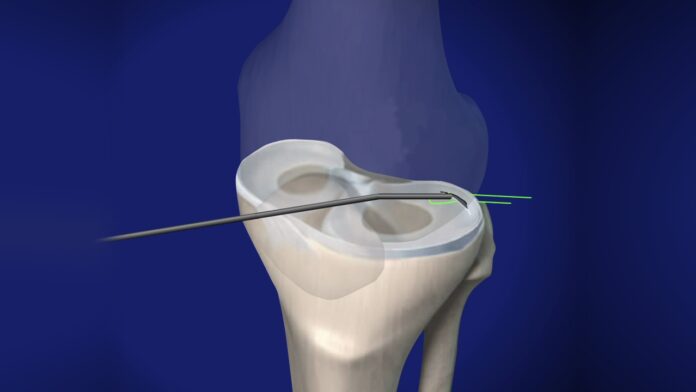The long-term effects of meniscus repair are an important question in the medical community. It is widely known that a torn meniscus can lead to osteoarthritis, but there’s still much debate as to whether repairing it increases or decreases the risk of developing this condition.
In this article, we will investigate the current understanding of how meniscus repair affects long-term osteoarthritis risk and explore potential new areas for further research. We will also look at what steps can be taken now by those who have had a meniscal tear repaired to help reduce their risk over time.
Join us as we delve into the science behind this complex issue and discover whether or not having your meniscus repaired carries any additional risks beyond those associated with untreated tears.
What is Meniscus Repair?
Meniscus repair is a type of orthopedic surgery that involves repairing or replacing the meniscus, which is a key component of the knee joint. The procedure typically occurs when there has been an injury to the meniscus, or when it has degenerated due to age-related wear and tear.
It can involve arthroscopic techniques, where small incisions are made to view inside the knee joint using an endoscope; open techniques involving larger incisions; partial removal of all or part of a torn meniscus; and even transplantation from donor tissue. The long-term effects of meniscal repair have not yet been fully understood.
This article will examine whether increased osteoarthritis risk may be associated with this form of surgery. Osteoarthritis develops over time as cartilage surrounding joints wears away, leading to pain and difficulty moving or bearing weight on affected areas. It’s important for people considering undergoing this type of surgical procedure to understand any potential risk factors so they can weigh their options accordingly before deciding what course is best for them.
The Long-Term Effects of Meniscus Repair

The long-term effects of meniscus repair have been a topic of discussion for years. Many studies have sought to determine whether or not the procedure increases the risk of osteoarthritis in patients. To date, research suggests that there is an increased risk over time but more research is needed to better understand the exact impact and mechanism involved in this increase.
Studies suggest that while a successful meniscus repair can be beneficial initially and help reduce pain, it may also come with certain risks down the line. In some cases, the repaired tissue may experience degeneration due to poor healing or wear and tear. This could lead to further injury or even an accelerated development of osteoarthritis as time passes. It appears that age plays an important role here, with older individuals being at higher risk than younger ones after meniscal repair surgery.
Another factor affecting long-term outcomes is how well patients stick with their postoperative rehabilitation program and follow-up care instructions from their doctor throughout the recovery period. Appropriate physical therapy exercises are key for helping preserve joint function and mobility long-term; neglecting them can result in weakened muscles around the joint making it vulnerable to further damage over time which might lead to early onset arthritis if proper precautions are not taken during the recuperation phase.
Overall, understanding these potential risks associated with meniscal repairs can help both patient and physician make informed decisions about treatment plans going forward.
Does Meniscus Repair Increase Osteoarthritis Risk?
When it comes to meniscus repair, the long-term effects are not always known. One of the most concerning questions is whether this procedure can increase a person’s risk of developing osteoarthritis. Osteoarthritis is a degenerative joint disease that is caused by gradual wear and tear in the joints.
It affects millions of people around the world and can have debilitating effects if left untreated. This article seeks to explore whether there is an increased risk of osteoarthritis after meniscus repair surgery. We will look at scientific research conducted over recent decades that have looked into this topic in depth. Well also consider current medical advice regarding postoperative care and any potential risks associated with meniscus repair surgery.
By examining these topics, we hope to gain insight into how likely it is for someone who has undergone such a procedure to develop osteoarthritis later on in life. While some studies suggest that the long-term risks may be minimal, others point out possible causes for concern when considering postoperative care or specific conditions related to pre-existing knee problems before undergoing such treatment methods.
Since no two patients are alike, it’s important to evaluate each case closely before making any assumptions about their potential future health outcomes following meniscus repair surgery. Ultimately, only time will tell what effect this type of medical intervention could have on one’s overall risk for developing osteoarthritis down the line – but by considering all available information now, we can ensure that those who undergo this type of procedure receive optimal care both during and after recovery period to minimize any potentially detrimental consequences against them later in life
Conclusion

The findings from this study suggest that meniscus repair does not increase the risk of osteoarthritis in the long term. While there may be some short-term risks associated with meniscal injury and subsequent repair, these do not necessarily correlate to an increased risk of developing osteoarthritis later on.
Therefore, it is reasonable to conclude that while caution should be taken when considering a course of treatment for a meniscal tear or injury, the long-term effects on one’s future health should remain minimal overall.




